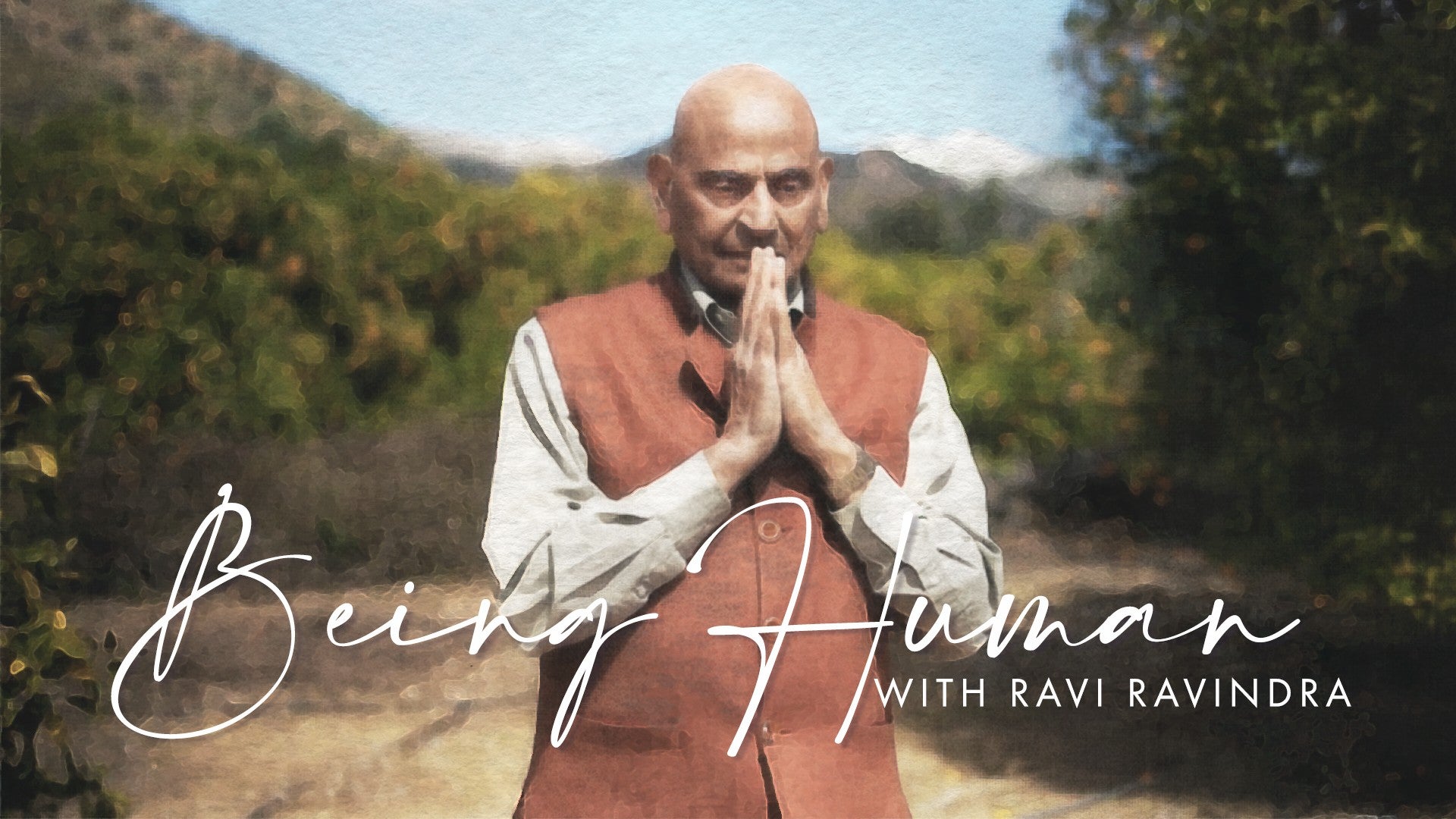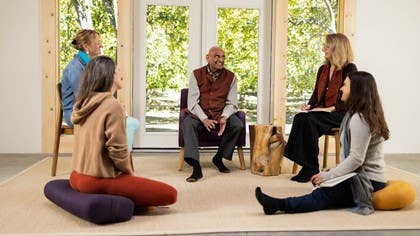Description
About This Video
Transcript
Read Full Transcript
As we have already said earlier that the whole purpose of spiritual practice is to enhance the quality of our being so that we can become more and more human, more compassionate, more understanding, more inclusive and bringing more and more real service to the enhancement of the quality of the whole nature, earth, human beings. And Patanjali's Yoga Sutra is very much concerned with this. Often people don't seem to realize this so I would now today actually very much focus on one particular Sutra in the first chapter, 33rd Sutra. In fact let me even read this to you for a few moments and then we'll speak about it. A clear and tranquil mind results from cultivating friendliness towards those who are happy, compassion towards those who suffer, joy towards the virtuous and impartiality towards wrongdoers. Now when we look at it to see how we can actually see what takes place in our own mind, in our heart when we encounter people of various kinds. For example I ask myself if a neighbor of mine I just learned today has just won a lottery accidentally for a few million dollars. What is my reaction to this? I have a specific example I'll tell you. Actually we have a Nobel Prize winner in chemistry at the University of Toronto, John Polanyi. I have known him for some time and he surprised me actually by telling me on one occasion at breakfast that after he got Nobel Prize nobody other colleagues in his own department no longer want to even speak to him anymore. But people coming from other places are eager to meet him because he is a Nobel Prize winner so they go out of their way to come and meet him but his own colleagues no longer want to even talk to him or do anything. They are feeling as if he got the prize and somehow we didn't get it and so I was very struck by this remark of his and then I have been questioning myself how do I respond to somebody. This is why I raised this question to you people. If somebody, a neighbor let's say or your brother or somebody gets a large amount of money accidentally or by lottery and similarly the other side. If somebody has hurt you by some remarks or some other way how can we bring some compassion to this? Because it is also true that there are people I often run into them really even from Canada and USA are very rich countries but even here there are some many people who are homeless who don't have enough to eat and occasionally I run into somebody like this in the town where I live and it's not their choice. They may come from a family where they have had poverty or the father or some mothers usually father who somehow tormenting them for some reason or the other have had criminal records. More and more I have also learned from a psychiatrist that many of the criminals actually seem to be almost genetically oriented towards that. That their parents or usually their fathers were criminals themselves and so they also end up undertaking. So it's not that they actually have a choice about this. They in poverty or even criminality is somehow imposed on them just where they happen to be born or somebody has exploited them has given them drugs etc and now they have very little choice about doing anything. So when one begins to slightly understand the background of this then one can naturally bring some more compassion. So what I am suggesting is that after all the whole practice of yoga by which I don't mean just physical yoga is really to enhance the quality of our being. More understanding, more compassion. So how can I actually understand these people who are having difficulties or even doing something which from my perspective is wrong and might even occasionally do something which is harmful to me. So in that context then Patanjali actually has many other suggestions how to cultivate something like this. Actually all the following five or six sutras in that very chapter first chapter from 34 to 39 Patanjali has some very specific suggestions how we can cultivate right attitude of compassion and goodwill. One thing he's suggesting very strongly is attention to the outward and inward flow of breath. This is something which really needs to be emphasized. If you pay attention to your breath without holding it outside or inside it actually gradually deepens your breathing and you can begin to notice that if I am angry or feeling resentful or feeling hurt any of these things it actually changes the quality of my breathing. Then in reverse if I pay attention to my breathing and therefore enhance the quality of my breathing it changes my attitude to other people to other things or whatever is whatever I'm encountering or is taking place. So this is a very strong physical practical suggestion that in encountering something an event or a person who I don't specially like or I'm feeling resentful about how to bring some attention to my breathing and more and more you would see actually in fact I'm always surprised if you read standard medical books they say that an average adult breathes 16 to 23 times per minute. It is almost impossible for anybody practicing yoga even just physical yoga to breathe more than 9 or 10 times a minute. So already you see the kind of change it brings. If you are breathing so shallowly that you're bringing 20 times a minute it can hardly nourish your body certainly not nourish your feelings and mind. So it's very important to give a great deal of attention to your breath. In fact I remember a conversation with Peter Brook who is very well he's now passed away just a few months back but a very well-known theater director and he actually said that even the best actors cannot really completely copy the right breathing unless they actually have a practice of that. It's not easy to just simply copy something or to act like that and that the quality of our breathing gets displayed by my attitude even my posture but attitude as you know is the French word for posture but in English we would mean by that a feeling kind of attitude. That my posture and attitude and how I behave towards others is very much influenced by the quality of my breathing. So I'm trying to emphasize to you that Patanjali's Yoga Sutra is really extremely practical book if one would pay attention to this. Now then he has some other suggestion here. Again something that I have already reminded you earlier also that we keep calling it my breath but it's really the divine breath in us what is which is keeping us alive as I mentioned this the book of Genesis explicitly says this and then just to remind you that in all ancient languages for example Sanskrit Greek Arabic Hebrew as far as I can determine from various scholars in all of these ancient languages the word for spirit and breath is either exactly the same or very close to each other. Therefore a reminder that what we call breath is really the entry of the spirit in us. So it's very important to keep that come through this. Then the other suggestion Patanjali makes that we can cultivate right feeling or right compassion this is the very next Sutra from steady attention to subtler levels of sensation. Now just to be with it a little bit I think I mentioned earlier Sri Anirvan a great sage in India said that even the subtlest spiritual experiences are sensation in the body.
Now it is important for us to understand that there are many many levels of sensation. For example my shirt is touching my arm that's also sensation. Now the kind of sensation one is talking about is very subtle inside. Again and again a reminder that there are external organs of perception I have eyes which can look outside I have ears which can but there are internal organs of perception. You know I can even close my eyes and let's say I see what is taking place. So very strong suggestion in the whole of the yoga practice to develop these internal organs of perception more and more sensitivity and therefore for example if we really feel that there is energy of divine energy or energy of Krishna in me how do I sense it that requires really subtler and subtler deeper and deeper sensation and to cultivate more and more sensitivity to the of the body. It's a very fundamental requirement in practicing more and more yoga and which is why we have this remarks of Christ for example one of his remarks which you can find in all canonical Gospels or even letter of Romans even Prophet Isaiah says something that you have eyes but you do not see. You have ears but you do not hear. Now clearly they are referring to different kind of eyes. My ordinary eyes I can see but the invitation is to subtler eyes so I can see something. As Saint Paul actually even explicitly says eyes of flesh see the things of flesh eyes of the spirit the things of the spirit. So the whole practice or practical point of view from a spiritual practice is to develop the eyes of the spirit. So I can I can see sometimes I'm surprised we hear for example our astronauts saying well we went out into the space we did not see angels so they don't exist. Should we just dismiss what Christ saw? In fact a particular experience I had with Krishna Murthy going for a walk on one occasion there was a little pool we stopped by it and he looked into it he says look how they sing. Now I have absolutely no idea what he's seeing I was not hearing anything I was not seeing anything but he didn't want to elaborate this very much because when I asked him something oh he says just dismissed my question but it was obvious to me that he was seeing something I could now call it a fairy or something like that who was singing but I was not seeing it nor hearing it but he is able to see it or hear it. So I feel that one needs to understand that the eyes of the spirit are quite different from the eyes of the flesh and this call that the eyes of the spirit are needed to see the things of the spirit. So Patanjali's very strong suggestion that if I can relate more and more deeply with internal sensation hearing more subtly seeing more subtly then I can hear things which others do not hear but that doesn't mean that I am better than the others but it's a different kind of development different kind of quality. So therefore any suggestion that one can just forget about the body is completely silly from the Yoga Sutra point of view there is never any suggestion to just ignore your body. The body has to be cultivated its sensitivity needs to be cultivated similarly the feelings have to be cultivated and then the other suggestion he actually he has some very interesting suggestions for all this here. But before I just read the next one I just want to remind you a remark of a very great philosopher Plotinus and you see similar remarks in the Mandu Kyopanishad as well that when you know or just I quoted St. Paul that we need something corresponding to the type of things we are seeing the instrument needs to be the right instrument to see it. All the scientists would agree with this as well. Not every instrument can see everything and so this is the remark of Plotinus. To any vision must be brought an eye adapted to what is to be seen and having some likeness to it. Never did I see the Sun unless it had first become Sun like and never can the soul have vision of the first beauty unless itself be beautiful. So you see the whole call for enhancing the quality of our soul is in order to see something which is truly spiritual and to enhance this is not again a matter of so much an achievement but willing myself to be assist allowed myself to be touched by this subtler energy is coming to touch me here. So what assists to develop more and more sensation from a practical point of view is to intentionally connect our mind with the body because the mind is just wandering around it is it I always feel it belongs to the opposing team. It's trying to help the others not me. I think I quoted yesterday Madame Blavatsky saying mind is the slayer of the truth and but the body is much more stable so to connect the mind with the body is a good way particularly when you just begin your meditation to start with I highly recommend this as a practice so to connect it with the spinal column or with any place in the body not connecting any rigid fashion but more and more trying to become sensitive to that part of the body it will very much assist him. Then the very next sutra I highly recommend to you to read this six of heaven sutras they're very very practical then the next sutra is by one can come to this sensitivity more and more by experiencing inner radiance free from sorrow so if you have ever had an experience in which you were really joyous joyous very joyful which can sometimes happen at least in my experience particularly when you see some young kids doing quite miraculous upside down they are running around doing and they're interested in everything I'm just amazed by the amount of energy the kids seem to have yeah I mean I would get tired in five minutes by doing any of these things and they can carry on I have a granddaughter who is now 10 but particularly when she was seven or eight I was just absolutely amazed how much energy she had and interested in everything actually sometimes even go and pick up some stone they're put in her mouth to taste how they taste I've you know as if of course we try to prevent them from not getting getting disease or something but they have no such barrier to anything so very strong suggestion that if you have ever had a joyous experience personally for me also for example looking at something very large such as the ocean or the stars in the sky partly because then one can be one realizes that I'm merely a minor little particle in this trillions of galaxies here so one can be a little free of being attached to me me me that is always really the fundamental requirement a little freedom from myself and so I find that or any other moment of joy that you have had if you can recall it he says very much here by experiencing inner radiance created by this kind of event free from sorrow it can very much assist because it's really the call again and again is freedom from our smallness we get so attached to it every great teacher makes a remark of this kind for example Christ remark it's actually in all the canonical Gospels but the one in the Gospel of Matthew unless you leave yourself behind you cannot be a follower of mine in fact elsewhere it is more strongly expressed unless you die to yourself or die to the world you know very strongly expressed but again a simple reminder to leave myself behind doesn't mean to be against it to be free of something does not mean to be against something it's just to be sure that it is not controlling my life which is why I mentioned even yesterday even to be free of one's ego doesn't mean to be against the ego it also has its place so again a very strong suggestion from Patanjali that if I can recall some particularly illuminating or joyous experience and try to relate with that again and then I can be a little free of my resentment of the others one can have more forgiveness even for those who have done something harmful or bad because they are not anymore it can control of themselves than I am they are being driven by many things many forces so more and more compassion can come from this and really again a very strong suggestion he says by meditating on the longing of the heart what is the longing of my heart so by meditating on this he says is another way of cultivating this thing I invite you to really read this sutras in this is from first chapter 33 to 39 sutra I'm obviously just quoting from there and very strong suggestion that if I can find what is the longing of my heart and then by meditating on it it's a more and more attention but more and more relaxation in fact a friend of mine used an expression which I found very interesting to be like a relaxed arrow because usually we think of an arrow being having a certain rigidity but a straightness but to be a relaxed arrow this is that I find this is an interesting interesting expression of but then I will actually quote this is from the second chapter thirty-third and the thirty-four sutra when negative thoughts and feelings arise the opposite should be cultivated cultivating the opposite is realizing that negative feelings such as that of violence result in endless suffering and ignorance so if I sense anything negative feeling in me how can I then actually make an effort to be free of this as much as I can because it is just going to lead to more suffering for me not only for the others and more and more ignorance because as I try to say even yesterday that feeling is actually the first avenue to truth even some other very greatest scientists actually would agree with this for example Pascal some of you have heard his name I'm sure we measured pressure by so many Pascal's this is his remark that reason sorry heart has reasons that reason does not know heart has reasons that reason does not know and most of these great poets artists scientists would all agree that we first of all get somehow a hint or an intuition or just a vague impression about something and that is coming more from the feeling then from the thinking then of course the mind needs to come in and just a simple reminder here let me take a moment to say this here mind does not experience all experience is by sensation or by feeling and this is true also even by the external measurements for example in science scientific measurements how high the temperature is that is not determined by the mind that is that is determined by looking at how high in the thermometer how high the mercury is so this is true not only for internal observations it is also true for external observation all experience or experiments even are not by the mind then the mind can look at the data produced by these experiences and of course a clever scientist can look at several kinds of data and say well here is a theory which will incorporate all of them so there is no need to be against the mind and this is another reminder here there is a bit of a tendency in some circles as if we need to just get rid of the mind but Anjali is certainly not suggesting that very strong suggestion is that our usual mind is not a good instrument of perception that it is not the real seer for example the telescope is not the real seer it's the scientist he sees through the telescope but then one can have a good telescope or a bad telescope so from Patanjali's point of view we can have a good mind or a bad mind but it is not the seer good mind here is actually this is directly from the yoga sutras I'm quoting here now that good mind is like a completely clear diamond does not introduce its own color to whatever it sees just allows the object to be seen completely in the color of the object rather than introducing something of its own color so Patanjali is not in any sense against the mind far from it mind is the instrument through which purusha or God actually sees which is the reason I keep saying not to be against the body or the mind it is meant to be the instrument to assist the evolution of the particle of divinity which has taken on my body and my mind so sometimes you read this in spiritual some circles oh you can forget about the mind or forget about the body it is completely silly similarly the word ego that I mentioned whatever to be free of something requires not to be against it but to find its proper place even the devil has his place so not to be against the mind certainly Patanjali in anywhere in the yoga sutras you would never find anything against anything and I just mentioned to you his whole suggestion that we initially the very opening sutras as you all know yoga is stopping all the movements of the mind because the usual movements of the mind are not clear diamond so that when the movements are stopped then the real seer can see through the mind so the mind is really like the telescope for a scientist how to develop a good telescope not to be against the telescope so I think that is what we need to be doing maybe for the time being I will stop here I invite you strongly to read some of these sutras in the Patanjali's yoga sutras and everything sutra is very practical thank you very much
Being Human
Comments

You need to be a subscriber to post a comment.
Please Log In or Create an Account to start your free trial.







